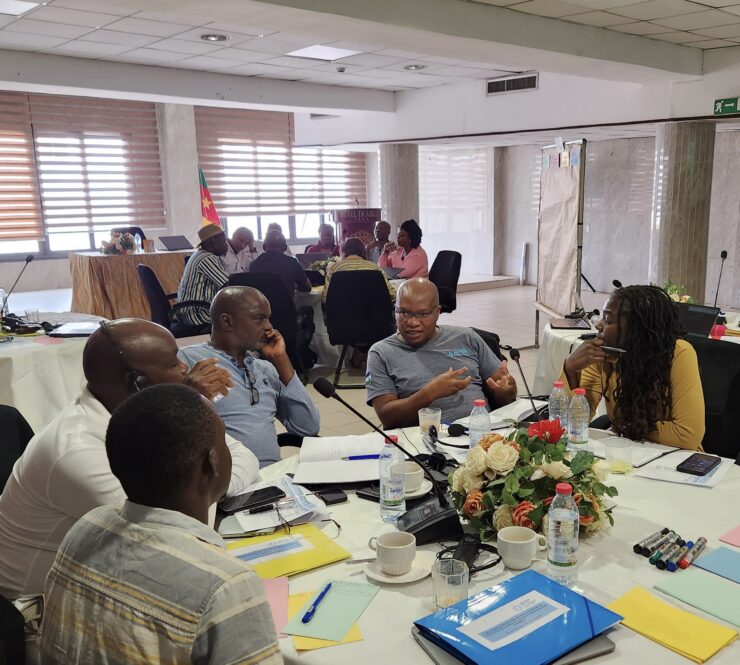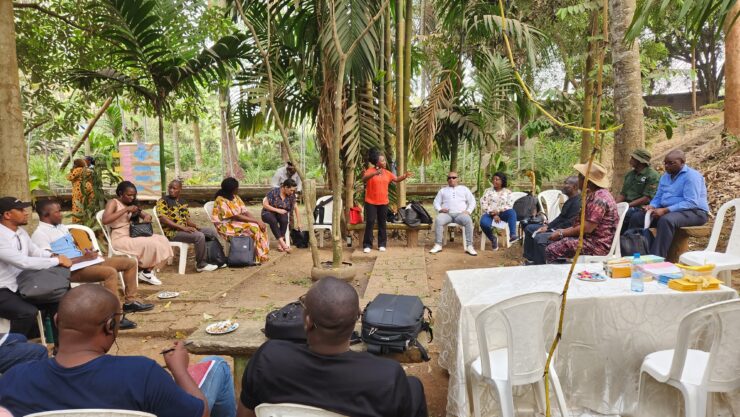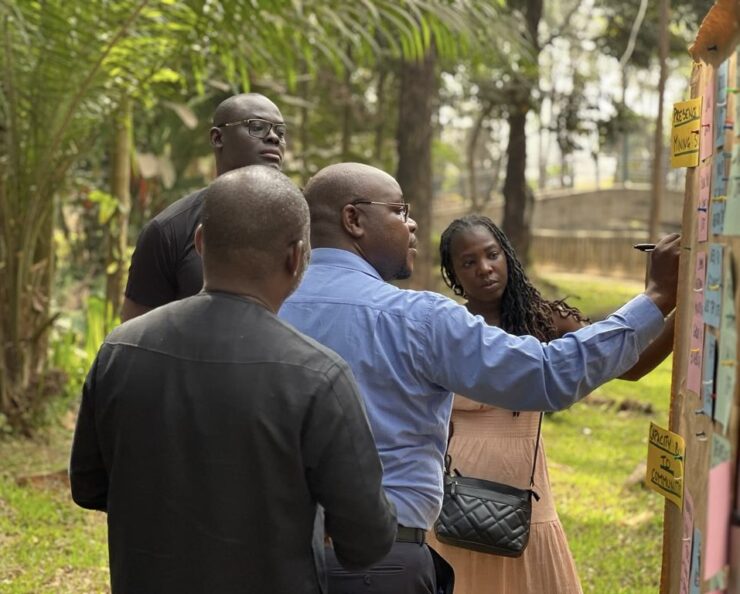Early 2024, the Kimberley Process Civil Society Coalition (KP CSC) met in Yaoundé, Cameroon for its annual planning meeting. The objective of the meeting was to take stock of progress, share experiences, and plan further work to protect the rights of communities living from or near diamond mines as well as to improve diamond governance at the national and international level.
Representatives of 14 member organisations from, Botswana, Belgium, Cameroon, Central African Republic, Côte d’Ivoire, Democratic Republic of Congo, Guinea, Sierra Leone, Lesotho, Liberia, and Zimbabwe were present.
Promoting a human rights-based approach to diamond governance
The coalition refined its mission and vision. The KP CSC calls on governments and industry to work towards “Rights Diamonds for Development”, ensuring that diamonds are mined in ways that contribute to and ensure the well-being of communities living from or near diamond mining.
This specifically means:
- That diamonds are not tainted by violence or any form of rights violations in communities where diamonds are mined.
- That diamond mining contributes to the economic, social, and physical well-being of communities affected by diamond mining and trade along the supply chain. This requires an improved distribution of benefits and meaningful community engagements that ensure adequate contributions to the provision of infrastructure, social services, and a local economy where jobs and wealth are created.
- That diamond mining and trade along the supply chain adhere to sound environmental practices ensuring prevention of the harmful environmental effects.
Panel discussion on preventing mineral-fuelled conflicts and promoting better diamond governance for the benefit of local communities
At present, communities do not enjoy the benefits of diamond mining. Until today, cases where diamond mining is linked to violence and human rights abuses persist. The Kimberley Process certification scheme, tasked to break the link between rough diamonds and armed conflict fails to address the many stains on diamonds, even on those that are sold as “conflict-free”. Diamond mining still fails to achieve the development potential it could have.
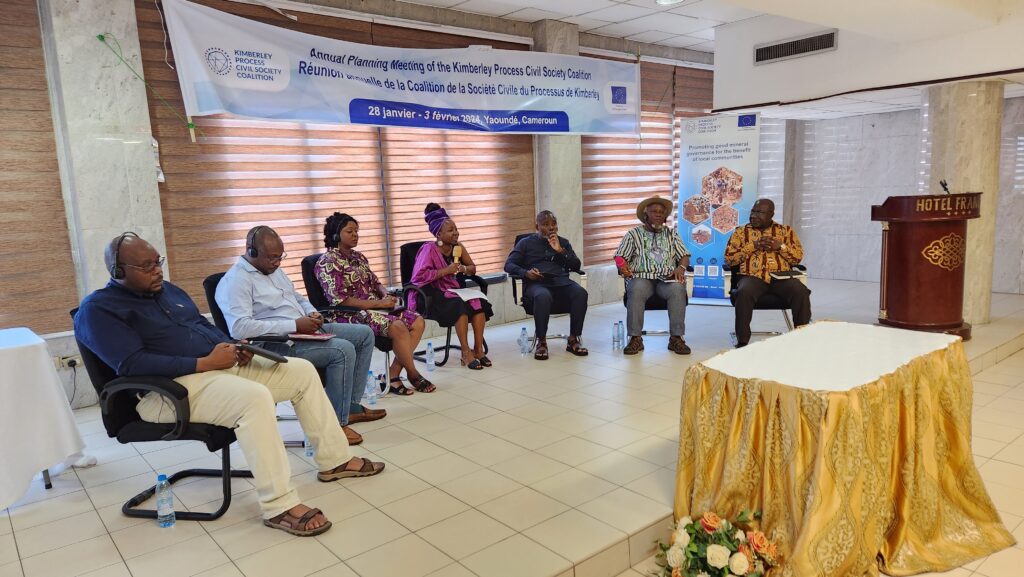
In a panel discussion, attended by the national KP Focal point, partners and Cameroonian journalists, Esther Finda Kandeh (WOME, Sierra Leone) highlighted the challenges that women are facing in diamond mining. Abu Brima (NMJD, Sierra Leone) insisted on the importance of community involvement in diamond governance. Jimmy Hamuli (CENADEP) pointed out the environmental damage that diamond mining can cause: he reminded the audience of the case of pollution of hundreds of kilometres of the Democratic Republic of Congo’s Tshikapa and Kasai rivers due to pollution from ‘industrial diamond mines’ in neighbouring Angola. Michel Yoboué (GRPIE, Côte d’Ivoire) finally reminded the audience of the profound crisis of the Kimberley Process, and stressed that civil society will also engage with various other responsible mineral governance initiatives in Africa and beyond to exchange lessons from the different mineral sectors.
All these challenges have one thing in common: there is a clear lack, at all levels, of decent governance frameworks for diamond mining. Shamiso Mtisi (ZELA, Zimbabwe) pointed out that many governmental and multistakeholder instruments exist to up the diamond game: the Africa Mining Vision, the Business and Human Rights framework or the OECD guidelines, to name just a few. Action is required, at local, national, regional and international levels, by governments and industry, to improve on diamond governance. Jaff Bamenjo (RELUFA, Cameroon) announced that the KP CSC is developing a Model Diamond Governance Framework (MDGF) to go beyond the traditional boundaries of the Kimberley Process, towards a comprehensive and human rights-based approach to diamond governance that prioritises communities. By addressing critical gaps in diamond governance at all levels, the MDGF defines concrete actions that can be taken to make diamond resources directly benefit communities, leading to positive change in their lives.
Jaff Bamenjo taking on the role of KP CSC coordinator
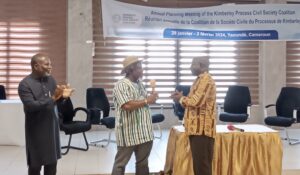
Finally, the Coalition also focused on internal governance during the meeting, welcoming Jaff Bamenjo of RELUFA in Cameroon as the new Coordinator and thanking Michel Yoboué for the work accomplished within this role since 2020. Members also elected Abu Brima as Vice Coordinator. Finally, the Angola-based civil society organisation Observatory for Social Cohesion and Justice Angola became an associated member of the coalition.

More articles on the Coalition’s planning meeting
KP CSC urges stakeholders to create safe environment for local communities – 04/02/2024 – Cameroon News Agency
La société civile du Processus de Kimberley, plaide pour le diamant de développement en Afrique – 05/02/2024 – VOA
Journal télévisé bilingue – 7/02/2024 – Equinoxe
Subscribe to our mailing list for more updates on our activities.

